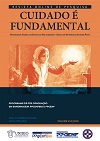Self-Assessment of Knowledge in Paliative Care by Physicians Resident of a University Hospital / Autoavaliação do Conhecimento em Cuidados Paliativos por Médicos Residentes de um Hospital Universitário
DOI:
https://doi.org/10.9789/2175-5361.rpcfo.v12.9490Keywords:
Cuidados Paliativos, Corpo clínico hospitalar, Educação Médica, Conhecimento, Autoavaliação.Abstract
Objetivo: Verificar a autoavaliação do conhecimento de médicos residentes do Hospital Universitário Lauro Wanderley (HULW) acerca de Cuidados Paliativos (CP). Métodos: Realizou-se um estudo observacional, transversal, quantitativo, envolvendo médicos residentes do HULW, que responderam ao questionário com perguntas sociodemográficas e conhecimentos em CP. Resultados: Dos 172 médicos, 99 (57,6%) participaram da pesquisa, 47,5% entre 28-32 anos e 54,5% do sexo feminino.A maioria respondeu que aprendeu sobre o controle dos sintomas comuns na assistência paliativista, embora 97% necessitassem aperfeiçoar seus conhecimentos sobre CP. Apenas 16,2% conheciam a atual Lei de Bases dos CP, porém mais de 80% compreendiam os aspectos bioéticos pesquisados. Contudo, mais de 75% de respostas compatíveis com conhecimento sobre CP ocorreram em apenas 5 das 16 questões (31,2%). Conclusão: Existe relativa escassez de conhecimento acerca dos CP entre os médicos entrevistados, tornando indispensável estudos adicionais de intervenções curriculares que possam contribuir para o aperfeiçoamento desses profissionais.
Downloads
References
– Nnadi DC, Singh S. Knowledge of palliative care among medical interns in a tertiary health institution in northwestern Nigeria. Indian J Palliat Care. 2016; 22(3):343-7.
- Hermes HR, Lamarca ICA. Cuidados paliativos: uma abordagem a partir das categorias profissionais de saúde. Ciênc. saúde coletiva. 2013; 18(9):2577-2588.
- World Health Organization. Nacional Cancer Control Programmes: Policies and Managerical Gideline. Word Health Organization. Genebra; 2002. p. 181.
- Matsumoto DY. Cuidados Paliativos: conceitos, fundamentos e princípios. In: Carvalho RT, Parsons HA. Manual de Cuidados Paliativos. 2. ed. São Paulo: Academia Nacional de Cuidados Paliativos, 2012. Cap. 2.6 p. 176.
- Santos CE, Caldas JMP, Serafim JA, Barros N, Pereira AC, Capra MEZ, Stein A, Freitas A. Palliative care in Brazil: with a view to future needs?. International Archives Of Medicine. 2017; 10(148):1-9. doi: 10.3823/2418.
- Murray S. The 2015 Quality of Death Index: Ranking palliative care across the World. The Economist: The Intellingece Unit. Londres; 2015. p. 66.
– Chochinov HM. Dying, Dignity, and New Horizons in Palliative End-of-Life Care. A Cancer Journal for Clinicians. CA Cancer J Clin. 2006; 56:84–103.
- Rego S., Palácios M. A finitude humana e a saúde pública. Cadernos de Saúde Pública. 2006; 22(8):1755-60.
- Blasco P. A ordem dos fatores altera o produto. Reflexões sobre educação médica e cuidados paliativos. Educación Médica; 2016. p. 11.
– World Health Organization. Palliative care [internet]. [acesso em 2019 jul 20]. Disponível em: http://www.who.int.
- Gamondi C, Larkin P, Payne S. Core competencies in palliativecare: an EAPC White Paper on palliative care education - part2. Eur J Palliat Care. 2013; 20(3):140-145.
- Burns KE, Duffett M, Kho ME, Meade MO, Adhikari NK, Sinuff T et al. A guide for the design and conduct of self-administered surveys of clinicians. CMAJ. 2008; 179(3):245-52.
– Pinheiro TRSP. Avaliação do grau de conhecimento sobre cuidados paliativos e dor dos estudantes de medicina do quinto e sexto anos. O Mundo da Saúde, 2010; 34(3):320-326.
- Brasil. Decreto no 7.562, de 15 de setembro de 2011. Dispõe sobre a Comissão Nacional de Residência Médica e o exercício das funções de regulação, supervisão e avaliação de instituições que ofertam residência médica e de programas de residência médica. Brasília; 2011b. [acesso em 2019 jul 22]. Disponível em: http://www.planalto.gov.br/ccivil_03/_ato2011-2014/2011/decreto/d7562.htm#art50.
- Head BA, Schapmire TJ, Earnshaw L, Chenault J, Pfeifer M, Sawning S et al. Improving medical graduates' training in palliative care: advancing education and practice. Adv Med Educ Pract. 2016; 24(7):99-113.
- Patel A, Deo S, Bhatnagar S. A Survey of Medical Professionals in an Apex Tertiary Care Hospital to Assess Awareness, Interest, Practices, and Knowledge in Palliative Care: A Descriptive Cross-sectional Study. Indian J Palliat Care. 2019; 25(2):172-180.
- Toledo AP, Priolli DG. Cuidados no fim da vida: o ensino médico no Brasil. Rev Bras Educ Med. 2012; 36(1):109-17.
- Lustosa AM, Dutra F, Moreira MADM, Evangelista CB, Duarte MCS, Zaccara AAL et al. Palliative care: the speech medical residentes. Rev Med Minas Gerais. 2015; 25(3): 355-360.
- Brugugnolli ID, Gonsaga RAT, Silva EM. Ética e cuidados paliativos: o que os médicos sabem sobre o assunto? Rev. bioét. (Impr.) [Internet]. 2013 [acesso 2019 fev 12]; 21(3):477-85. Disponível: https://bit.ly/2le7CQA.
– Conceição MV, Vasconcelos MCC, Telino CJCL, Guedes EVB, Pimentel DMM. Conhecimento sobre cuidados paliativos entre médicos residentes de hospital universitário. Rev. Bioét. [Internet]. 2019 mar [citado 2019 jul 15]; 27(1):134-142.Disponível em: http://www.scielo.br/scielo.php?script=sci_arttext&pid=S1983-80422019000100134&lng=pt. http://dx.doi.org/10.1590/1983-80422019271296.
- Vial P, Ibáñez P, Umaña A, Reyes MM, Viviani P, Nervi F. Self assessment about proficiency on palliative care in a cohort of residents. Rev Med Chil. 2004; 132(4):445-52.
- Alamri SH. Knowledge of the residents at King Abdul-Aziz University Hospital (KAAUH) about palliative care. J Fam Community Med. 2012; 19:194-7.
- Mohamed ZU, Muhammed F, Singh C, Sudhakar A. Experiences in end-of-life care in the intensive care unit: a survey of resident physicians. Indian J Crit Care Med [Internet]. 2016 [acesso 2019 fev 12]; 20(8):459-64. DOI: 10.4103/0972-5229.188196.
- Farrell M, Ryan S, Langrick B. Breaking bad news within a paediatric setting: an evaluation report of a collaborative education workshop to support health professionals. J. Adv. Nurs. 2001; 36(6):765-75.
- Borges MM, Santos Junior R. A comunicação na transição para os cuidados paliativos: artigo de revisão. Rev Bras Educ Méd [Internet]. 2014 [acesso 2019 fev 12]; 38(2):275-82. DOI: 10.1590/S0100-55022014000200015.
- Roy É, Côté RJ, Hamel D, Dubé P-A, Langlois É, Labesse ME et al. Opioid prescribing practices and training needs of Québec family physicians for chronic noncancer pain. Pain Res Manag [Internet]. [acesso 2019 fev 12]; 2017:1365910. DOI: 10.1155/2017/1365910.
- Green CR, Wheeler JR, Marchant B, LaPorte F, Guerrero E. Analysis of the physician variable in pain management. Pain Med. 2001; 2(4):317-27.
- Wiese CH, Loffler EK, Vormelker J, Meyer N, Taghavi M, Strumpf M, et al. Cancer pain therapy in palliative care patients: knowledge of prehospital emergency physicians in training: Prospective questionnaire-based investigation. Schmerz. 2010; 24:508-16.
- Vieira RC, Morais MTM, Sarmento LMC, Ferreira ADC, Muñoz RLS. Demanda por cuidados paliativos em enfermarias de clínicas gerais. Revista Ciência e Estudos Acadêmicos de Medicina - Número 8. Universidade do Estado de Mato Grosso - UNEMAT (Cáceres). 2017; 8: 20-40.
Published
How to Cite
Issue
Section
License
Copyright (c) 2020 JRFCO

This work is licensed under a Creative Commons Attribution-NonCommercial-NoDerivatives 4.0 International License.
TRANSFER AGREEMENT COPYRIGHT I transfer copyright of the article to the Journal of Care Survey is Fundamental - Online - RPCF, so it is accepted due to electronic publishing. The copyright includes the right to reproduce in whole or in part by any means, distributing that article, including figures, photographs, and any translations. The author can also print and distribute copies of your article, stating that since the rights belong to RPCF. I declare that this manuscript is original and has not been submitted for publication, in whole or in part to other online journals or not, so BMMC in the Annals of scientific events or book chapters.






























